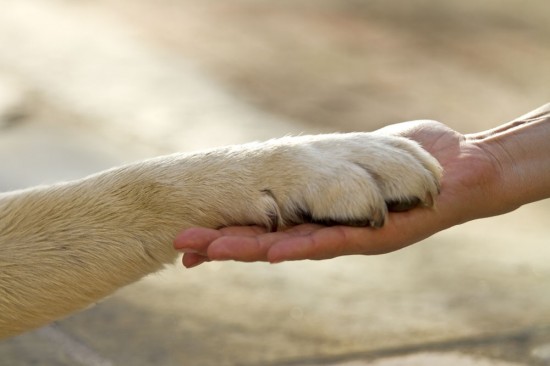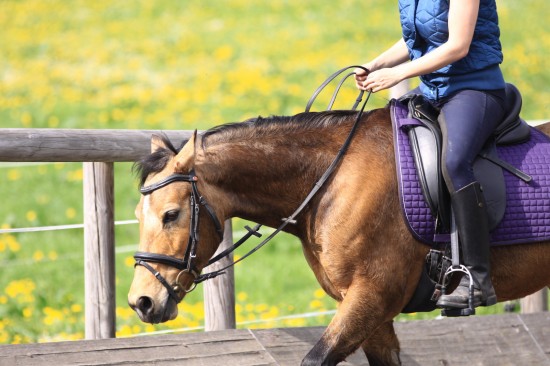
In the past, when people spoke of training collars, they really generally were referring to 揷hoke chains.?A choke chain is a metal chain with a sliding ring that is attached to your dog抯 nylon or leather leash.
There抯 a reason it抯 called a choke chain. Because there is no limit on how tight the training collar can pull against your dog抯 neck, there exists a very real possibility it can choke him, as well as cause other injuries, such as:
And if you think I抦 kidding about any of these injuries: I抦 not; they抮e all well-documented cases taken from hundreds of veterinary practices who have treated the dogs injured by choke chains.
Bottom line? In the hands of an experienced trainer, a choke chain can be used appropriately, but for the most part, your average person has no idea what an appropriate use of a choke chain entails.
My own personal preference is for a flat buckle collar, either nylon or leather, which can be used for training and everyday use. It should fit snugly, but leave room enough for you to slide two fingers between the collar and your dog抯 neck. Any looser than that, and it may slide off over your dog抯 head. Any tighter and it may cause chafing and discomfort.
The choice of nylon or leather is simply a matter of personal preference ?nylon comes in a variety of bright colors, and is a good choice for dogs that spend a lot of time in the water (or mud!) Leather is durable and will absorb oils from your dog抯 coat, making it more flexible over time.
The width of the collar should be appropriate to your dog抯 size. For example, a wide, heavy or thick collar just won抰 work on a Chihuahua, in fact, it would look ridiculous. By the same token, if you have a Rottweiler, a diamond- or rhine-stone-studded poodle collar is going to look pretty silly. And don抰 forget an identification tag ?if your dog is lost or stolen, this is a quick way for authorities to notify you when your pet is located.
Another terrific solution is a harness ?a device that goes around the neck and ribcage, thus eliminating the possibility of choking. Harnesses are an excellent resolution to the problem of having a large dog that hasn抰 been well-trained and pulls or lunges when out for a walk. It抯 a great way to restrain the pulling without getting in that choking 搕ug of war?that you sometimes see. Harnesses are also good for small dogs, which can have serious problems with collars pressing on their small and fragile airways.
Now for the proper leash. As with collars, you have a choice of flat nylon or leather (or braided leather is also available), and as with collars, it抯 largely a matter of personal preference.
I use a 6 foot nylon leash for training my dog. I find it抯 the perfect length for walking, heeling and virtually all of my training sessions.
Many dog owners prefer a retractable leash. These are nylon leashes that are encased in a plastic casing, and vary in length up to about 25 feet or so. The best models of this type have a one-button 揵raking?system that stops your dog from going beyond a set distance, as well as a spring mechanism that allows you to adjust just how far you want to extend the lead.
Retractable leashes are a good idea if you walk your dog in a variety of settings: you can 搑eel?him in if you抮e on city sidewalks or in situations where there are a lot of people or other dogs around, then you can expand the distance between you when you get to the park or an open space.
 The Pets4homes Dog Care Quiz - What Type Of Dog Owner Are You?
The Pets4homes Do
The Pets4homes Dog Care Quiz - What Type Of Dog Owner Are You?
The Pets4homes Do
 Finding The Right Horse Riding Instructor
Finding The Right
Finding The Right Horse Riding Instructor
Finding The Right
 How To Administer Pills And Capsules To Dogs
How To Administer
How To Administer Pills And Capsules To Dogs
How To Administer
 Taking Pet Care Services is a Smart Way to Care for Your Dog
Taking Pet Care Services is a Smart Way to Care for Your D
Taking Pet Care Services is a Smart Way to Care for Your Dog
Taking Pet Care Services is a Smart Way to Care for Your D
 The Senses Of Cats
The Senses Of Cat
The Senses Of Cats
The Senses Of Cat
Copyright © 2005-2016 Pet Information All Rights Reserved
Contact us: www162date@outlook.com